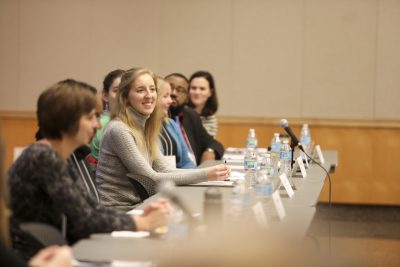The Careers in History Symposium: An NCPH Mini-Con
30 January 2017 – Stephanie Rowe

Participants in the Networking Lightning Round during the Careers in History Symposium hosted by Indiana University–Purdue University Indianapolis. Photo credit: IU School of Liberal Arts at IUPUI
On Saturday, November 12, 2016 the National Council on Public History (NCPH) and the Indiana University–Purdue University Indianapolis (IUPUI) Public History MA program hosted over one hundred students and faculty from seven states in Indianapolis for our biennial Careers in History Symposium. This sold-out NCPH mini-conference—planned in collaboration with Daniel Vivian, director of the University of Louisville Public History MA program—featured a full day of sessions, networking, and speakers designed to showcase the variety of careers available to those who pursue a degree in history. The NCPH hopes to replicate this particular Mini-Con at other universities by developing a Careers in History Symposium toolkit.
NCPH Mini-Cons are locally organized regional events designed to maintain the energy, conviviality, and productivity of the annual meeting year-round. First piloted in 2014, the NCPH membership committee and executive office continue to build and expand this program. The IUPUI Mini-Con began with the symposium’s signature event: the Networking Lightning Round. During this session, a panel of twelve speakers, ranging from secondary school history teachers to museum and historical society curators, each had just three minutes and two images to describe their career paths and current jobs. After this overview, students had the chance to meet and ask questions of five of the speakers in small groups during rotating fifteen minute sessions. Many participants pointed to this activity as the highlight of the symposium. Reminiscent of the always popular Speed Networking event at the NCPH annual meeting, it set the tone for a fast-paced, interactive day filled with up-close access to professionals in the field.
The morning closed with a keynote presentation from Kent Whitworth, executive director of the Kentucky Historical Society and steering committee member for the History Relevance Campaign. Whitworth talked with attendees about the power of history to inspire and the need to advocate for the field. The keynote presentation allowed participants to think about careers in history through a bigger lens than during the Lightning Round, which focused more on the nuts and bolts of particular positions. After the keynote address, David Heard, director of the IUPUI School of Liberal Arts’ Office of Career Development, offered a lunchtime session that combined résumé writing and résumé review.
In the afternoon, participants broke into smaller groups to attend one of three breakout sessions. The breakouts were intended to provide more specific content to attendees based on their current status. (Attendees included undergraduate, graduate, Ph.D., and postdoctoral students, as well as faculty.) The first breakout option—“What Do I Do After College?”—was designed for current undergraduate students and offered information on topics like entering the job market with a B.A. versus applying for an M.A. The second breakout session—“How Do I Make the Most Out of Grad School?—was geared toward B.A. students already applying to M.A. programs or first-year M.A. students and offered information on how to use grad school experiences to position themselves to be competitive on the job market. The third breakout—“How do I Transition Out of Grad School?”—offered advice from two recent M.A. hires and two hiring managers on preparing to successfully secure a job.
After the breakout sessions, participants reconvened for closing comments by Philip Scarpino, director of IUPUI’s public history graduate program. Scarpino shared data gathered by the American Association for State and Local History–American Historical Association–NCPH–Organization of American Historians–Joint Task Force on Public History Education and Employment. The task force surveyed public history employers to understand what skills and knowledge they value most and to identify trends in hiring practices. Attendees got a preview of that survey’s results ahead of the release of the formal report to the membership of the sponsoring organizations. Scarpino also shared preliminary data from a survey of alumni from public history and related M.A. programs designed to track career paths of public historians and to understand trends in the public history job market.
After the close of the event, an evaluation was sent to all of the participants. Of the 35% of participants who responded, 97% rated the event as successful. The Networking Lightning Round was a highlight for many, with comments such as, “The speed networking event exceeded my expectations. I felt that I was able to gain a much better understanding of the realities of joining the workforce with a history degree, particularly BA vs MA.” And, “Great opportunity for students to get a better understanding of the job market in public history. Excellent networking opportunities and a broad representation of professionals in the field.” Event-wide commentary was similar, with one student noting, “This seminar highlighted what types of jobs are available for those in the history field. I’m aware now that I need to gain experience through volunteering, etc. to enhance my resume and learn what I want to do in the field.” Faculty who attended also found value in the experience stating, “I was able to learn a great deal of career information that will be relevant for my students. I thought the length of the conference was appropriate and that the panelists were fantastic” and “Great opportunity for students to get a better understanding of the job market in public history. Excellent networking opportunities and a broad representation of professionals in the field.”
This symposium is one of the best examples of collaboration between the IUPUI history department and the NCPH. The NCPH office plans to develop a Careers in History Symposium toolkit to allow other colleges and universities to host this NCPH Mini-Con on their own campuses with some planning support from the executive office. Look for more on the toolkit in 2017. If you are interested in hosting a similar event or have questions, see the current guidelines and contact Christine Crosby.
~ Stephanie Rowe is executive director of the National Council on Public History.



